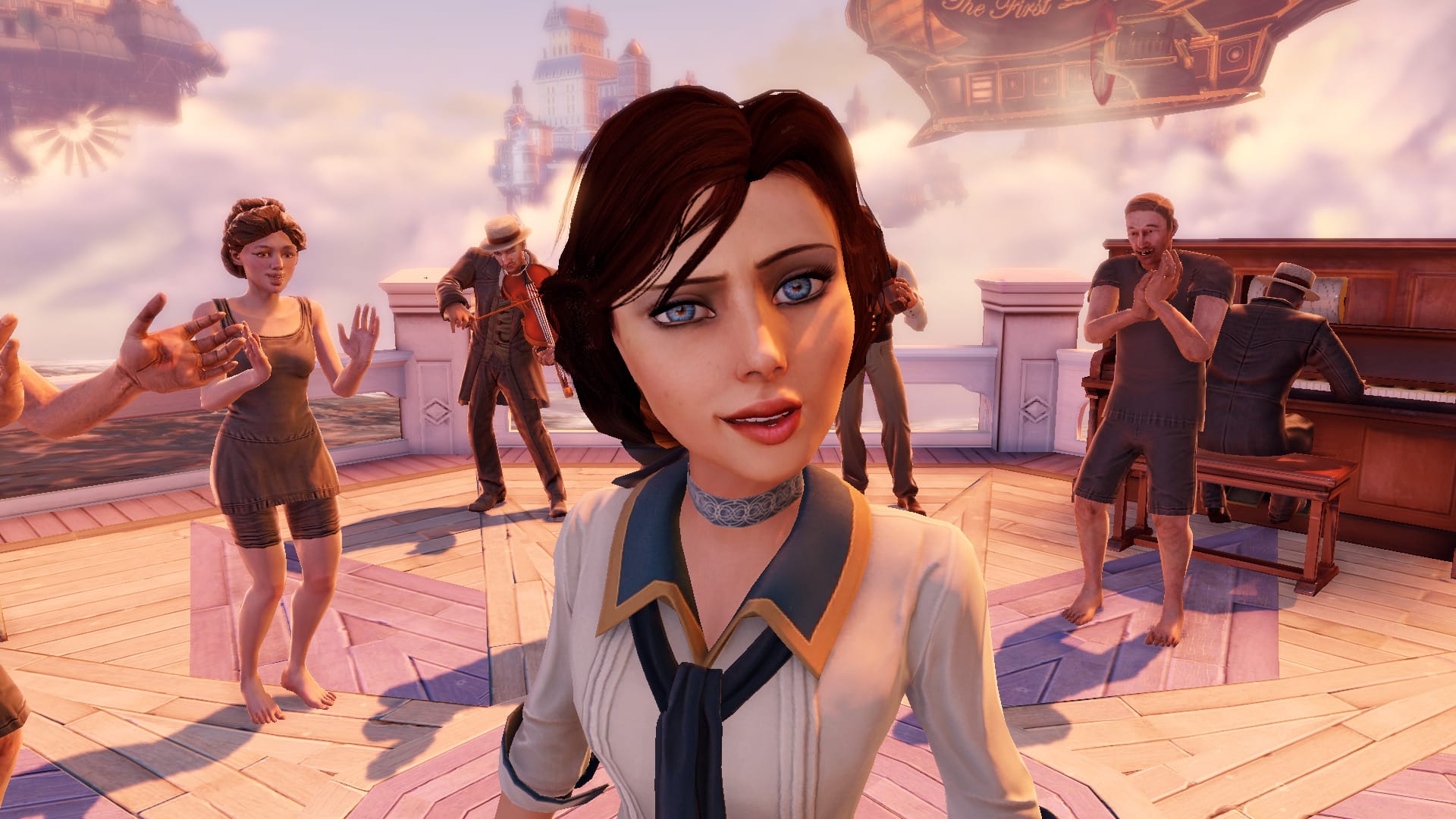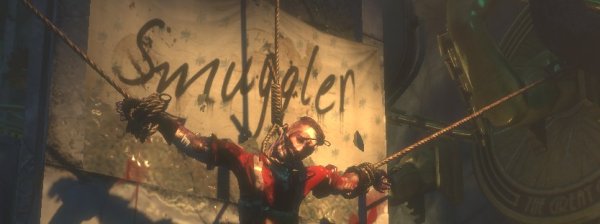Bioshock: Infinite
I just finished Bioshock a couple hours before starting this post. As a sort of testament to the quality of this game; it made me break my silence on blogger. If you haven’t played it, go fix that. I intend to talk about the game without regard for the spoilers it may contain or imply.
Seriously, if you haven’t played yet, go do that instead. This is not a game to be experienced through synopsis. After that, hit the jump to read more...
To be honest, I’m not quite sure where to start with the game. So I’ll start with what will be the easiest thing for me to talk about: art direction.
(Real quick aside: this game’s art direction is fucking gorgeous and a technical marvel. I’m fairly certain that the people who disagree with me on this point must have had their eyes closed. It is also one of the most thoroughly and intentionally art directed games I’ve ever seen.)
 |
| so pretty |
Bioshock: Infinite (which will be calling ‘Bioshock’ for the rest of this post), owes a lot of its look to Disney films. A lot of people have been pointing this out in reference Elizabeth’s character design, but I find it a much more striking comparison when you’re looking at the colors. The glow of the sunlight off the city’s white walls, the blue atmospheric perspective that makes the distant buildings melt into the clouds; this is Columbia putting her best foot forward. These shots really wouldn’t look out of place in a Disney fairy tale.
 |
| Bioshock |
This is what we never got to see of Rapture; the boom times. We never saw Rapture as Andrew Ryan saw her. Columbia, on the other hand, is beautiful and shining and spotless. There are humming birds and rainbows (the first rainbow I’ve ever seen in a game, by the way), people are singing, children are playing. Everything is perfect. Everything is as Father Comstock intended.
This sets up the player’s expectations for the city. As Booker Dewitt, you feel out of place. You are here to kidnap a girl to pay of a debt. Especially once the fighting starts (by you ripping open a man’s face), you feel like a blight on this perfect city, smearing blood and dirt wherever you go.
This is how Booker sees himself. He doesn’t think of himself as good or noble or even necessary; he’s just a bad person. Of course he’d arrive and start ruining lives, it’s basically his modus operandi. This is what is so often mistaken about Bioshock: the violence is supposed to be hideous and out of place because Booker is hideous and out of place.
The longer you play, though, it becomes apparent that, as bad as Booker is, the darkness that he brought is not new to Columbia. This city was built on racism, hate, and torture. You may feel like you’re the cause of the bloodstains everywhere, but you’re really just peeling back the layers of paint on the city’s white facade.
Looking back at what I just wrote, I realize that I am proliferating another misconception: that this is a story about you.
Booker Dewitt is not you. Booker Dewitt is a racist, alcoholic, murderer, and he is completely aware of all of these faults. Bioshock is constantly trying to remind you of Booker’s faults through his soliloquies and through conversation with Cornelius Slate and Elizabeth. All the way up to the confrontation with Comstock, Booker is establishing that he hates himself and is actively trying to get himself killed.
Some players have critiqued this sort of vocal character, saying it makes it hard to identify with Booker (source). Actually, this is the entire reason (near as I can tell) that Booker needs to be a speaking character; so that the game can let you know that he isn’t you. In the original Bioshock, Jack was a fairly blank slate (plot twists and character revelations aside). You were fighting for survival as Jack. Character motivations were unimportant as the player’s goal didn’t extend much further than “don’t die”, and neither did Jack’s. Even when the story switched to being primarily about revenge instead of survival, the player wanted revenge as much as Jack did.
 |
| The original Bioshock was pretty harsh too... |
Booker, on the other hand, has a lot of motivations and history that the player is not privy to. I’m not even referring to the things Booker didn’t know because they happened on an alternate timeline, I’m talking about his time as a soldier or a pinkerton, or about his daughter, or about his history with religion; there are a lot of important plot points that we learn from Elizabeth’s perspective, rather than Booker’s.
But I mentioned that Booker is trying to kill himself, right? He’s tried a quite a few ways of killing himself in a bunch of different timelines: He’s tried to kill himself by drinking, by gambling, by being baptised (killing “Booker” and giving birth to “Comstock”), by beating Comstock to death, by suggesting the plan to smother Comstock as a baby, by doing unnecessarily risky things like using the sky-lines (and the skydiving that entails), going to the fair and participating in the raffle when he has been warned it will get him killed, chugging mysterious liquids that give him vivid hallucinations of his own mutilation, even going to Columbia in the first place are all incredibly risky things (here, he was successful at killing himself 122 times before the player takes control, as tracked by the talleys on the Luteces’ chalkboard) that Booker throws himself into because he doesn’t care if he dies, but he’s too afraid or too proud to just commit suicide.
Neither Elizabeth nor the player know Booker’s guilt-ridden backstory or his relationship to Comstock until very near the end of the game, and so, can’t appreciate Booker’s focus on self-harm until they are reflecting back on it.
 |
| I'm with Elizabeth on this one. |







No comments:
Post a Comment